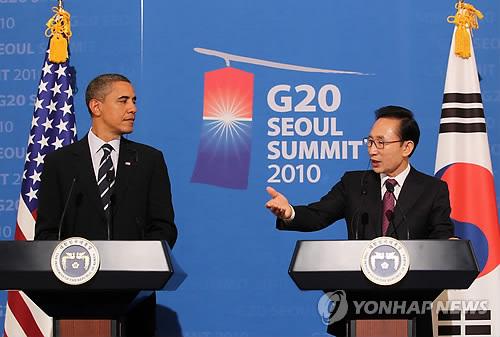After two days in Seoul for the G-20 summit, President Barack Obama left yesterday with an agreement on a broad set of economic guidelines for member countries, but also noticeably sans a trade deal with South Korea.
“Here at Seoul, we agreed that growth must be balanced,” said Obama during a press conference at the conclusion of the summit. “Countries with large deficits must work to reduce them, as we are doing in the United States…. Likewise, countries with large surpluses must shift away from unhealthy dependence on exports and take steps to boost domestic demand. As I’ve said, going forward, no nation should assume that their path to prosperity is paved simply with exports to the United States.”
The final agreement also commits G-20 nations to move toward more flexible exchange rates. “All of us need to avoid actions that perpetuate imbalances and give countries an undue advantage over one another,” said Obama.
Although the president tried to paint an optimistic picture of G-20 accomplishments, media outlets like Bloomberg and Foreign Policy noted Obama fell fall short in his goals for dealing with current-account surpluses and balances because of resistance from China and Germany, which have two of the world’s largest surpluses. He and South Korean President Lee Myung-bak also failed to iron out ongoing disagreements concerning American auto and beef imports as part of the Free Trade Agreement, though both leaders said they were still hoping to strike up a deal post-summit.
According to Bloomberg, the deal would be the U.S.’ largest since the 1994 North American Free Trade Agreement, with $68 billion in trade between the two nations. The summit was part of Obama’s 10-day trip to Asia, with stops also in India and Indonesia. Today the president was to meet with Japanese Prime Minister Naoto Kan and attend the Asia-Pacific Economic Cooperation forum.
Photo Credit: Yonhap News







